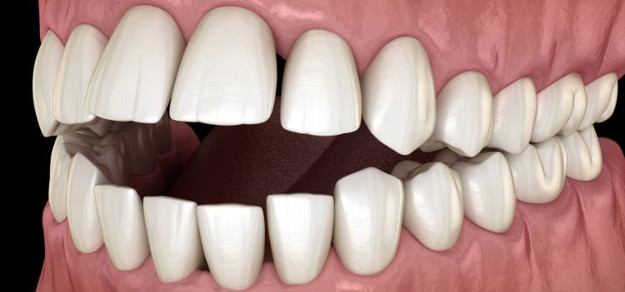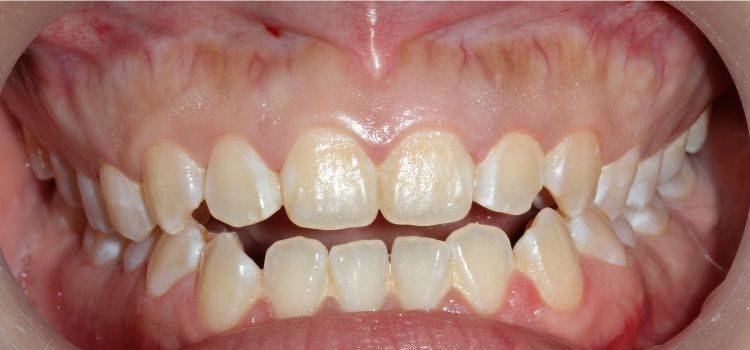Can a Night Guard Cause an Open Bite?
7th Nov 2025

Wearing a night guard should help protect your teeth, but what if it changes your bite?
Some people notice their front teeth no longer touch after using a night guard. This is called an open bite, and it can be confusing and frustrating.
Here’s why it can happen, what to do about it, and how to protect both your teeth and your bite.
Can a Night Guard Really Cause an Open Bite?

Yes, it can, but only in some cases. A night guard might change your bite if it doesn’t fit well or only covers certain teeth.
According to Colgate, when your front and back teeth don’t align properly, it can lead to issues like trouble chewing, speaking, or swallowing, and even cause speech changes like a lisp.
While this isn’t common with night guards, it’s possible if:
- The guard only covers certain teeth
- You’re clenching or grinding more than usual
- You wear it too long without checkups
- You skip adjustments as your teeth shift
A study in the British Dental Journal found that some people developed bite changes, like posterior open bites, after wearing night guards that weren’t properly adjusted or checked by a dentist.
Note: This isn’t common, but it’s possible. That’s why it’s important to watch for any changes in your bite and visit your dentist if something feels off.
Signs Your Night Guard Might Be Changing Your Bite
Your front teeth no longer touch
You may notice a gap between your top and bottom front teeth when you close your mouth.
Your bite feels uneven
Things don’t feel quite right when you bite down, like certain teeth touch more than others.
Chewing feels different
You might struggle to bite into or chew certain foods the way you used to.
Jaw discomfort or tightness
You feel tension, soreness, or stiffness in your jaw, especially in the morning.
Pressure on certain teeth
The night guard may be putting more force on specific teeth, which can slowly shift your bite.
Pro Tip: If you notice any of these changes, your night guard might need to be adjusted, or replaced. It’s best to bring it up with your dentist as soon as possible.
Related Articles:
- Bite Feels Different After New Night Guard
- Can A Night Guard Shift Your Teeth?
- How Should a Night Guard Fit?
What Should You Do If You Suspect a Problem?

Talk to your dentist
Don’t stop using your night guard without checking in first. Your dentist can see if it’s causing the issue and suggest adjustments.
Ask about refitting or a new impression
If your teeth have shifted, your guard may no longer fit properly. A new one might help relieve pressure in the right places.
Consider a different type of night guard
Some people do better with a softer material that spreads pressure more evenly.
Get a second opinion if needed
If you’re unsure about the advice you received, it’s okay to ask another dentist, especially if your bite is getting worse.
Weighing the Trade-Off: Protect Teeth or Preserve Bite?
This is the tricky part. Wearing a night guard protects your teeth from grinding and clenching. But if it’s not the right fit, it can slowly change your bite.
So what’s worse, damaging your teeth or shifting your bite?
The truth is, both can be serious. That’s why it’s important to find a balance. A well-fitted night guard should protect your teeth and keep your bite stable. If it’s doing more harm than good, it’s time to reassess.
Pro Tip: You don’t have to choose between protecting your teeth and keeping your bite healthy. With the right care and a properly fitted night guard, you can have both!
Are There Better Alternatives?
Yes, if your current night guard is causing problems, there are other options that might work better for you:
Softer night guards
Some people find that soft or hybrid guards are more comfortable and gentler on the bite.
Custom-fit guards made from new impressions
If your teeth have shifted, getting a new custom-fit night guard based on your current bite can make a big difference.
TMJ or orthodontic evaluation
If your bite has changed a lot, a specialist may be able to guide you on the best next steps, including possible treatment to correct the bite.
Related Articles:
- Guide to Choosing the Right Night Guard
- Wearing a Night Guard: Pros and Cons
- How to Get Used to Wearing a Night Guard

- Most Popular
- Hard Outside, Soft Inside
- 2MM Thick
- Moderate / Heavy

- Most Durable
- Hard Materials
- 1.5MM Thick
- Heavy / Severe

- For Day Time Use
- Thin, Barely Visible
- 1MM Thick
- Light / Moderate

- For Clenching
- Flexible & Soft
- 1.5MM Thick
- Light / Moderate
Frequently Asked Questions (FAQs)
1. Can your bite go back to normal after an open bite from a night guard?
In some cases, yes. If the bite change is caught early, your dentist may adjust the guard or suggest a new one. More serious changes may need orthodontic treatment.
2. What type of night guard prevents bite changes?
A properly fitted custom night guard that evenly distributes pressure is less likely to cause bite changes. Dual-arch and full-contact guards are often better options for people who clench or grind.
3. How long does it take for a night guard to cause bite changes?
Bite changes can happen gradually over months or even years, especially if the night guard isn’t regularly checked or adjusted by a dentist.
4. What are the long-term risks of developing an open bite from a night guard?
An open bite from a night guard can lead to jaw pain, trouble chewing, speech problems, and uneven tooth wear. If not corrected, it may cause TMJ issues and require orthodontic treatment in the future.
Final Thoughts: Protect Your Teeth Without Changing Your Bite
If you think your night guard is changing your bite, you’re not imagining it—and you’re not alone. Many people experience the same concern.
Your bite is just as important as protecting your teeth. If something feels wrong, talk to your dentist. With the right fit, your night guard should help, not harm.
Pro Teeth Guard offers custom-fit night guards made from your own impressions, just like at the dentist. They’re designed to fit comfortably, protect your teeth, and keep your bite stable. Every guard comes with a 110% money-back guarantee and a 1-year warranty.
References:
- Bereznicki, T., Barry, E., & Wilson, N. H. F. (2018, October 26). Unintended changes to the occlusion following the provision of night guards. British Dental Journal, 225(8), 715–722. https://doi.org/10.1038/sj.bdj.2018.869
- Huang, W., Shan, B., Ang, B. S., Ko, J., Bloomstein, R. D., & Cangialosi, T. J. (2020). Review of etiology of posterior open bite: Is there a possible genetic cause? Clinical, Cosmetic and Investigational Dentistry, 12, 233–240. https://doi.org/10.2147/CCIDE.S231670
- Colgate. (2023, November). What is an open bite? Colgate. Retrieved June 18, 2025, from https://www.colgate.com/en-us/oral-health/early-orthodontics/what-is-an-open-bite
- Cleveland Clinic. (2023, May 15). Malocclusion (misalignment of teeth and bite). Cleveland Clinic Health Library. https://my.clevelandclinic.org/health/diseases/22010-malocclusion

- Most Popular
- Hard Outside, Soft Inside
- 2MM Thick
- Moderate / Heavy

- Most Durable
- Hard Materials
- 1.5MM Thick
- Heavy / Severe

- For Day Time Use
- Thin, Barely Visible
- 1MM Thick
- Light / Moderate

- For Clenching
- Flexible & Soft
- 1.5MM Thick
- Light / Moderate
